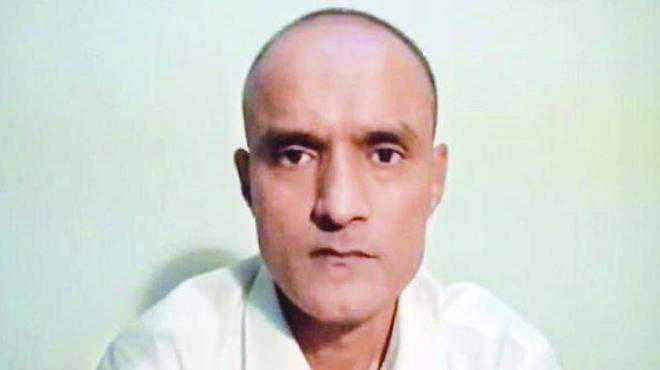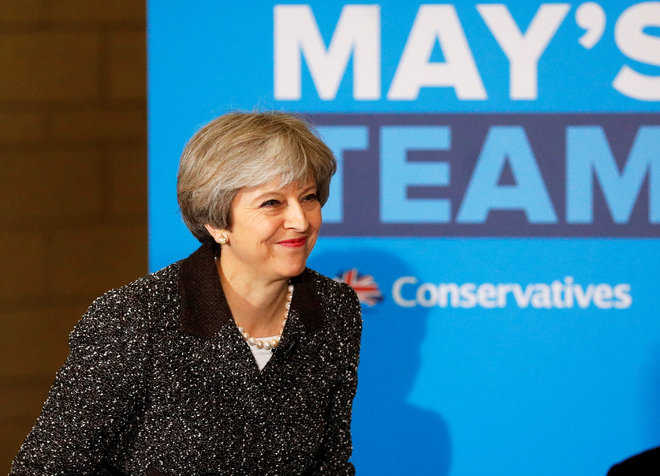
Kulbhushan Jadhav. File photo
New Delhi, May 9
The International Court of Justice today stayed the hanging of Indian national Kulbhushan Jadhav, who was sentenced to death by a Pakistani military court on charges of “spying”.The order by the Hague-based International Court of Justice came a day after India approached it against the death sentence handed down to Jadhav by Pakistan’s Field General Court Martial last month.(Follow The Tribune on Facebook; and Twitter @thetribunechd)India, in its appeal to the ICJ, accused Pakistan of “egregious” violations of the Vienna Convention on Consular Relations and asserted that Jadhav was kidnapped from Iran where he was involved in business activities after retiring from the Indian Navy but Pakistan claimed to have arrested him from Balochistan on March 3, 2016. Following the appeal, the ICJ stayed his hanging. — PTI
Indo-Pak politics plays out in UK elections

Theresa May campaigns in York
Ashis Ray in London
Twenty-four out of 650 constituencies in the House of Commons have 10-50% of overseas citizens of India or non-resident Indians. In effect, people of Indian origin have between a significant to a decisive say on who wins these seats.Virendra Sharma is the sitting MP for Ealing Southall, who attracted 65% of votes cast in the last general election in 2015. In a veiled reference to an undercurrent of subcontinental politics in his constituency, which has Sikhs and Hindus from India, Pakistanis and Afghans, he told a rally: “This is a British election and we should be debating British values, not old community conflicts, ancient arguments and squabbles from half a world away and half a century ago.”(Follow The Tribune on Facebook; and Twitter @thetribunechd)A section of Pakistani constituents had objected to his stout defence of India in a debate on Kashmir in the Commons. Without directly referring to this, he affirmed: “I will represent every religion, every culture and those unsure of where they belong.”Regardless of his being a rock solid seat for his Labour party, Sharma is taking no chances. Accompanied by activists, he is going door-to-door to canvass for support. One hundred and twenty-five years after the first Indian was elected to the British House of Commons, a turbaned Sikh is likely to make a maiden appearance in this chamber when results of the mid-term general election—unexpectedly summoned by Prime Minister Theresa May to strengthen her hand in Brexit negotiations with the European Union—are declared on June 9 next.Tanmanjeet Singh Dhesi, 38, has been selected by the opposition Labour party to fight in the constituency of Slough, 33 km to the west of London. He replaces Fiona Mactaggart, who stood down after being its MP for 20 years. In the last election, she won by a margin of 15.2% in a seat considered to be a relatively safe for Labour. “If elected, I will work tirelessly for the people of Slough,” he vowed to the Slough Express.Dhesi will be the third Sikh to enter the Commons after Piara Singh Khabra, who represented nearby Ealing Southall, and Marsha Singh, who stood from the Pakistan-dominated area of Bradford West. Both, though, were radical left-wingers who dispensed with long hair and beard as well as their turbans.Dadabhai Naoroji, a Liberal, entered the Commons from Finsbury Central constituency in London in 1892 and remained a member until 1895. He was followed by Sir Mancherjee Bhownagree, a Conservative, who won from Bethnal Green North East, also in London. He served as a lawmaker from 1895 to 1906.Then came the intriguing Shapurji Saklatvala, a former Tata employee and a cousin of the third chairman of the Group, Nowroji Saklatvala. In 1922, he stood for election on behalf of the Communist Party of Great Britain and won from Battersea North in the British capital. He lost the next year, only to be returned for a full five-year term in the Commons in 1924.Fifty-eight years elapsed before another politician of Asian extraction was ushered in to the Commons. Keith Vaz, born in Aden and of Goan descent, ended the drought by getting elected in 1987 for the Labour party from Leicester East, a constituency he has represented ever since.Others who earned the right to warm the gleaming green leather seats were Dr Ashok Kumar, Labour who won from Langbaurgh and Middlesborough South and East Cleveland, Parmjit Dhanda, Labour from Gloucester, Parmjit Gill, Liberal Democrat from Leicester South and Paul Uppal Conservative from Wolverhampton South West. The first mentioned died prematurely. The other three lost their seats, although Uppal is now back in the fray.The maternal grandfather of Sebastian Coe, a double Olympic gold medallist, was Punjabi. He was elected in 1992 from Falmouth and Camborne as a Conservative, before losing in 1997. Vaz’s sister, Valerie Vaz, Labour from Walsall South—who celebrated Baisakhi in the Houses of Parliament before the house prorogued—Seema Malhotra (who is up and coming and has served as shadow chief secretary to the treasury), Labour from Feltham and Heston, Lisa Nandy (who father was a Bengali doctor), Labour from Wigan, Shailesh Vara, Conservative from Cambridgeshire North West, Priti Patel, Conservative from Witham, Alok Sharma (a second generation Tory), Conservative from Reading West, hedge fund millionaire Rishi Sunak, Conservative from Richmond, Yorkshire, and son-in-law of NR Narayana Murthy of Infosys, and Suella Fernandes, Conservative from Fareham, are again in the running. Last year, Keith Vaz was forced to resign as chairman of the Home Affairs Select Committee—having performed creditably at this post since 2007—after an expose on his private life by the Sunday Mirror. It will be interesting to see how—if at all—his constituency of pre-dominantly orthodox Gujarati Hindus reacts to the episode. He met trustees of the Brahma Samaj over the weekend. In 2015, he ensnared 61% of votes.Indian-origin people still punch below their weight in terms of the contingent of MPs. They are 3.3% of the population, but occupy only 1.5% of the seats. But if the outgoing MPs are re-elected and Dhesi and Uppal are returned, the number of lawmakers of Indian descent would rise in the next Commons. Navin Shah in Harrow East, Resham Kotecha in Coventry North West and Ameet Jogia in Brent North are among those who’ve thrown their hat into the ring. With Patel enjoying cabinet rank and Alok Sharma a junior minister, Indian extraction politicians have in recent years enhanced their presence in Whitehall.
indian-origin people the deciding factor
- 24out of 650 constituencies in House of Commons have 10% to 50% of overseas citizens of India or NRIs
Sikh connection
- Tanmanjeet Singh Dhesi, 38, has been selected by opposition Labour party to fight in the constituency of Slough
- If elected, Dhesi will be third Sikh to enter the Commons after Piara Singh Khabra, who represented nearby Ealing Southall
- He, however, will be first turbaned Sikh to make a appearance in this chamber when poll results are declared on June 9
- The second was Marsha Singh, who stood from the Pakistan-dominated area of Bradford West
- Both Piara and Marsha, though, were radical left-wingers who dispensed with long hair and beard as well as their turbans
